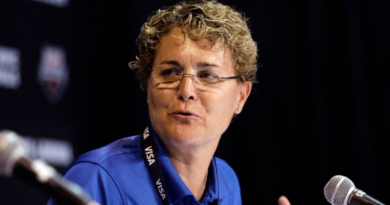No Renegade, no Ramblin' Wreck, lots of ranch dressing: How FSU and GT packed for Ireland
In the lead-up to Saturday’s kickoff between Florida State and Georgia Tech, both schools spent 17 months making spreadsheets, filling out documents and triple-checking customs regulations to make sure they packed all the essentials for their transatlantic trip.
Uniforms? Check.
Cleats? Check.
Ranch dressing? Umm, check?
The Ramblin’ Wreck? Sadly, back in Atlanta.
Renegade, Osceola and their flaming spear? If only that pesky quarantine issue had been solved.
Even without their most iconic pregame traditions traveling with them to Dublin, Florida State and Georgia Tech will headline Week 0 with everything they need to play football thanks to an exhaustive behind-the-scenes effort that Georgia Tech director of football operations Josh Thompson describes as “not for the faint of heart.”
In all, the schools combined to bring 238 crates weighing more than 40,000 pounds — packed and shipped on cargo planes last week — filled with everything from game day equipment to sport medicine essentials, protein powder, snacks such as Goldfish and yes, condiments that are not available in Dublin.
“There is no room for error here,” said Jason Baisden, Florida State assistant athletic director for equipment operations. “Once we’re there, we’re there. We can’t come back or can’t call and say, ‘Hey, bring this with you.'”
Both schools started to get ready for this game in March 2023, shortly after it was announced. Florida State director of football operations Bruce Warwick had been part of several overseas games in his previous stops in the NFL, so he already had a good idea about what moving an entire team more than 4,000 miles away would entail.
Beyond packing up all the necessary equipment, passports would have to be secured, multiple in-person site visits to the team hotel would need to be made (including food tastings) and communication with officials in Ireland would have to be precise. Nothing — like assuming that an American biscuit and an Irish biscuit were the same — could be left to chance.
“I had to learn to speak their language,” Baisden said. “Like, it’s not a uniform to them, it’s a kit. It is the English language, but we had to make sure nothing was lost with the translation of what we are doing.” Baisden and Thompson made calls to people they knew at Notre Dame and Navy, two schools that had previously played in Ireland. Baisden asked for their carnet, a document that facilitates temporary international imports and exports. Essentially, the carnet lists every item that is brought into a foreign country line by line, with exact numbers.
Want to bring snacks for the team? No problem. But every snack, from applesauce to crackers, must be listed. The same goes for rolls of tape, gloves, protein powders. You want to bring it? You have to list it.
At Florida State, Baisden became the point person between departments. In January, he asked the sport nutrition, sport medicine, creative video, weight training, radio broadcast and sports information teams to start identifying what they absolutely had to bring with them.
He described the process as preparing for “an overseas bowl trip.” But the detail with which everything had to be itemized goes far beyond any bowl trip preparation, where schools can just load up their equipment trucks and be on their way. For this trip, Baisden labeled every crate with what it was for — hotel, practice, game.
International travel is why the Ramblin’ Wreck and Renegade and Osceola were left at home. Irish officials had inquired about their availability, and both schools had serious discussions about finding a way to do it.
Renegade, the legendary horse ridden by Osceola before every Florida State home game to plant a flaming spear at midfield, would have had to quarantine on the way back to Tallahassee as required by international regulations. As a result, the horse would have been unavailable for the home opener against Boston College on Sept. 2. Plus, this is technically a Georgia Tech home game.
A gold and white 1930 Ford Model A Sport Coupe known as the “Ramblin’ Wreck” has led the Yellow Jackets onto the field for every home game since 1961. The Wreck would have to travel on a ship to get to Ireland. The travel time home would have meant it, too, would have been unavailable for the home opener against Georgia State on Aug. 31. There had been discussion about using an Irish “cousin” of the Wreck, a Peugeot-type stand-in from Dublin, but the idea was nixed.
There was plenty more that had to be discussed to get to the finish line. Florida State ended up having to get 85 passports for its players; Georgia Tech had to get 70 in total between players and staff. Perhaps the most unexpected challenge the teams faced was making sure they would be able to use the new technology allowed starting this season — coach-to-helmet communication and iPads on the sideline.
The headset systems coaches use on the sideline in the United States do not work overseas because they use different radio frequencies. Both schools had to rent new systems, and that means a different belt pack for coaches to get used to. Florida State practiced with them during scrimmages so the coaches could start to get a feel for them.
Thompson said the schools had to secure multiple lines of frequency for the communication headsets to work. The iPads required coordination with Aviva Stadium and local vendors for specific fiber lines used to update video in real time. The schools have had weekly calls with the ACC and different vendors to make sure everything is ready to go. Everything will be tested Friday.
“The coaches don’t like change. I don’t like change,” Thompson said. “Everybody is a creature of of habit. I want to walk into the stadium when the team walks in and make sure everything is done. I don’t want to have to be running around panicking, ‘All right, how are we going to handle this?'”
The teams went through different airports to have their cargo flown over, all at the direction of Aer Lingus, the game’s title sponsor. Florida State packed up a truck last week that left for Orlando, where its crates were then placed on cargo aircraft pallets called “cookie sheets” for international travel and then flown to Dublin. Georgia Tech had its cargo go on a plane to Chicago, and then on to Dublin.
Everything flown over arrived before the teams got in Thursday morning. Each team sent an advance group early to open crates and begin sorting items for use at the hotel or stadium. Equipment managers set up their respective locker rooms for Thursday practice. In addition, both teams had hundreds of cases of Powerade and water bottles directly shipped to both the hotel and stadium.
The hotels were chosen for their similarities to normal road hotels. They had to have large enough spaces available for team meetings, but also food that tasted like home. Warwick said grits, for example, were a nonstarter because the chefs could not cook them to specification. Florida State players have an affinity for ranch dressing, A1 steak sauce and Tabasco, items unavailable in Ireland, so those specific condiments were packed.
“The food is the biggest challenge because they like what they like and they know what they know,” Warwick said. “We tried to keep it as Americanized as possible.”
The teams themselves left the United States on Wednesday evening, but even their departures looked different. For domestic game travel, both teams go through TSA security screening at their respective stadiums before boarding buses and heading to their charter flights.
But for an international trip, both teams must go through the regular security line at their respective airports. It is one thing for Florida State to go through its small regional airport in Tallahassee. But just imagine the 289-person Georgia Tech travel party pulling up to Concourse F at Hartsfield-Jackson International Airport in Atlanta and going through security.
Aer Lingus, the title sponsor of the game, had to get special permission to secure a gate. Thompson said he has been assured there will be extra security lanes open to get Georgia Tech through efficiently. He plans to use a “pod system” where he separates the players into groups, with one designated the captain and responsible for making sure everyone has their passports.
Players will be reminded frequently about do’s and don’ts if they are bringing carry-ons, including the size of allowable liquids.
“I can’t wait to see when I’m the last person that goes through the TSA line what all was taken during that time,” Thompson said.
Now picture this upon arrival: Players standing around the baggage carousel, waiting for their player equipment bags. Those bags had to travel with them because both teams practiced all the way up to their departure day. So the bags get checked onto the plane upon airport arrival, for pickup in baggage claim, in addition to their own personal luggage. For this trip, Florida State got its players customized roller suitcases. Both teams will have a light practice at the stadium after they arrive, with the main goal to get everyone acclimated to the five-hour time change. Georgia Tech coach Brent Key, who went to Ireland for a game as a UCF assistant in 2014, said he does not want to make the trip any bigger than it has to be — drawing from his previous overseas experience.
“We overcoached those kids,” Key said, referring to UCF’s 26-24 loss to Penn State. “We tried to give them an experience. We took them to different places, took them on tours and it was just too much stuff when you’re going over there to play football game. Do you know what makes a great experience? Winning.”
To that end, Georgia Tech will fly home after the game as it has a tight turnaround to the following week. Because Florida State plays on a Monday night, coach Mike Norvell decided to have the team stay on Sunday for some sightseeing before returning to Tallahassee.
Though that approach is different, planning the logistics in the lead-up to the game has been identical. The schools have been in constant communication, but there will be anxiety upon arrival, during the game and postgame, too. Everything has to be repacked for travel back home, and at customs Saturday night. In both cases — travel to and from — both schools have to rely heavily on people they have never met to get the job done.
“Anytime and every time I travel, I worry if my bag is going to get there, so you definitely worry about that,” Thompson said. “You’re moving almost 300 people at one time. So you just have to make sure it is correct and right.”


